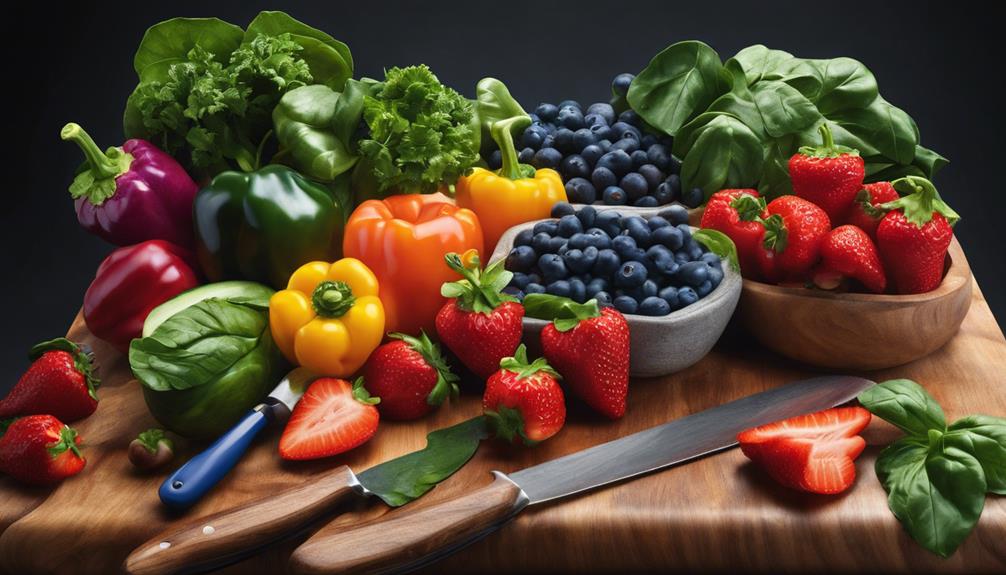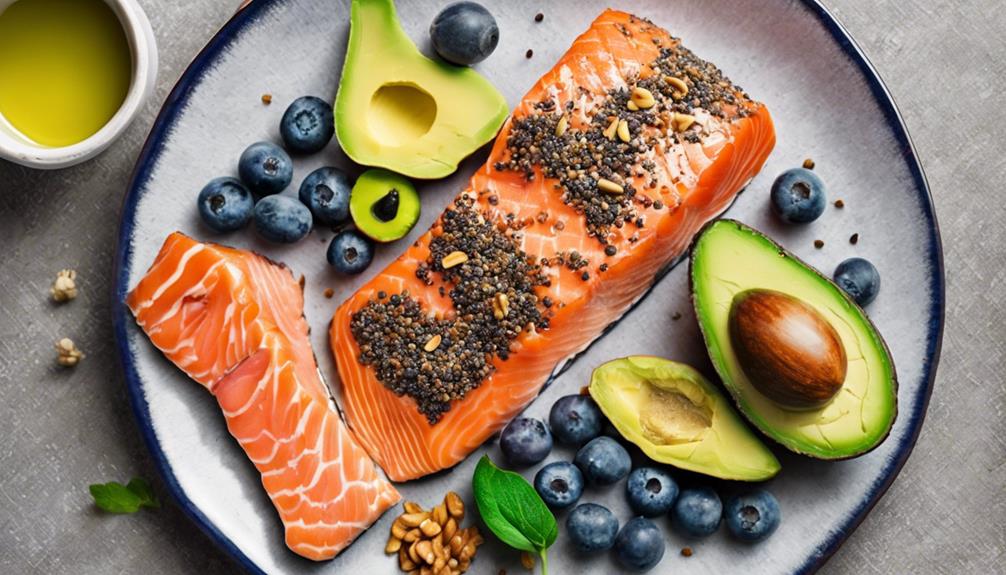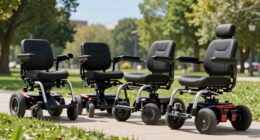When it comes to regaining our health after a stroke, the food we eat plays a critical role in our healing and recovery. Picture a meal that is vibrant in colors and textures, each bite aiding us in our progress towards improvement.
But what specific foods should we prioritize to support our healing process? Let's explore the impact of:
- Heart-healthy fats
- Antioxidant-rich fruits and vegetables
- Nutrient-dense nuts and seeds
- Essential omega-3 sources
- High-fiber foods on stroke recovery.
Key Takeaways
- Omega-3 fatty acids crucial for brain health and cognitive function
- Antioxidant-rich fruits and vegetables aid in stroke recovery and overall health
- Nutrient-dense nuts and seeds protect cells and enhance brain function
- High-fiber foods promote digestion, bowel regularity, and weight management
Heart-Healthy Fats for Brain Function
When aiming to enhance brain function during stroke recovery, incorporating heart-healthy fats rich in omega-3 fatty acids is crucial. These essential fatty acids, commonly found in fatty fish like salmon and mackerel, play a vital role in supporting brain health post-stroke. Research indicates that omega-3 fatty acids can aid in neuroprotection and improve cognitive abilities during the recovery process.
In addition to omega-3 fatty acids, sources of monounsaturated fats such as avocados and nuts like almonds can further enhance cognitive performance after a stroke. Nuts and seeds, like flaxseeds, are rich in healthy fats that promote neuroprotection and contribute to overall brain health. These nutrient-dense foods can be easily incorporated into a daily diet, providing essential nutrients for optimal recovery.
Following a Mediterranean diet, which includes olive oil as a primary fat source, not only benefits heart health but also supports brain function during stroke recovery. By consuming foods high in heart-healthy fats, individuals can improve cognitive abilities and aid in neuroplasticity post-stroke.
Antioxidant-Rich Fruits and Vegetables

Exploring a variety of antioxidant-rich fruits and vegetables is essential for supporting brain health and aiding in stroke recovery. These foods are packed with essential nutrients that can help improve overall health and well-being during the recovery process.
Here are four key items to include in your diet:
- Blueberries: Rich in antioxidants, blueberries promote brain-derived neurotrophic factor (BDNF) for cognitive function and help reduce cholesterol levels.
- Pomegranates: Containing antioxidants that support immune health, pomegranates are beneficial for overall well-being while recovering from a stroke.
- Citrus Fruits: Oranges and grapefruits are excellent sources of vitamin C, which protects brain cells and provides anti-inflammatory properties crucial for recovery.
- Apples: Offering antioxidants, fiber, and heart-healthy benefits, apples are essential for stroke survivors looking to enhance their recovery journey.
Including these antioxidant-rich fruits and vegetables in your daily meals can contribute to your neuroprotective needs, aid in stroke recovery, and support your overall health.
Nutrient-Dense Nuts and Seeds
Including a variety of nutrient-dense nuts and seeds in our daily diet is crucial for enhancing brain function, supporting cognitive performance, and aiding in stroke prevention. Nuts like almonds and walnuts are rich in vitamin E, which protects cells and enhances cognitive function.
Flaxseeds, high in alpha-linolenic acid (ALA), promote brain health by boosting brain-derived neurotrophic factor (BDNF), crucial for neuroprotection and neuroplasticity. Chia seeds are also valuable additions, providing essential nutrients for stroke recovery and overall brain function.
Sunflower seeds and pumpkin seeds offer magnesium, zinc, and antioxidants that support brain health and cognitive performance. By incorporating these nuts and seeds into meals or snacks, we can harness their diverse nutrients to nourish our brains and bodies, aiding in stroke prevention and recovery while supporting optimal cognitive function.
Essential Omega-3 Sources

Omega-3 fatty acids, crucial for brain health and stroke recovery, can be sourced from various foods like fish, flaxseeds, and chia seeds. Here are four key points to consider when incorporating essential omega-3 sources into your diet:
- Fish: Consuming fatty fish such as salmon and mackerel provides rich sources of DHA and EPA omega-3 fatty acids, which are vital for brain health and reducing inflammation in the body.
- Plant-based sources: Flaxseeds and chia seeds offer ALA omega-3 fatty acids, supporting neuroplasticity and aiding in stroke recovery by reducing inflammation and promoting brain cell repair and growth.
- Walnuts: Incorporating walnuts into your diet can also provide valuable DHA and EPA omega-3s, contributing to optimal brain and heart health during the recovery phase post-stroke.
- Soybeans and algae: These sources can be excellent alternatives for obtaining DHA and EPA omega-3 fatty acids, helping reduce the risk of recurrent strokes and supporting cardiovascular well-being throughout the recovery journey.
High-Fiber Foods for Recovery
After discussing the importance of essential omega-3 sources for stroke recovery, shifting our focus to high-fiber foods is crucial for supporting digestive health and overall well-being during the recovery process. High-fiber foods such as whole grains, fruits, and vegetables play a vital role in aiding digestion and promoting bowel regularity, which are common issues post-stroke.
Including fiber-rich foods in the diet can help prevent constipation, a prevalent problem during stroke recovery. Moreover, fiber promotes satiety and can assist in weight management, which is essential for overall health post-stroke. Legumes, nuts, and seeds are excellent sources of fiber that can be easily incorporated into meals for added nutritional benefits.
Frequently Asked Questions
What Foods Help With Stroke Recovery?
When it comes to stroke recovery, certain foods can play a crucial role in supporting the healing process.
Including omega-3 rich foods like salmon, flaxseeds for boosting BDNF levels, nuts and seeds high in vitamin E, avocados with oleic acid, and eggs for their protein content can all aid in cognitive function, neuroprotection, and overall brain health during recovery.
These nutrient-rich foods are key players in our journey to optimal healing post-stroke.
What Foods to Avoid After Stroke?
After a stroke, it's crucial to avoid foods high in saturated fats, trans fats, processed sugars, and excessive sodium. These culprits can elevate cholesterol, blood pressure, and increase the risk of recurrent strokes.
Opt for heart-healthy choices like lean proteins, whole grains, and plenty of fruits and veggies. By steering clear of harmful ingredients, we can pave the way for a smoother recovery and support our overall health journey.
What Is the Fastest Way to Recover From a Brain Stroke?
To recover quickly from a brain stroke, it's vital to engage in physical therapy, eat a balanced diet, get enough rest, and communicate regularly with healthcare providers. These steps can expedite the healing process and improve outcomes.
Additionally, seeking support from loved ones and participating in support groups can boost emotional well-being and aid in a faster recovery. Consistency in these areas is key to optimal recovery from a brain stroke.
How Long Does It Take for the Brain to Settle After a Stroke?
After a stroke, the brain typically undergoes significant changes in the first few weeks. Neuroplasticity allows rewiring and adaptation, leading to functional improvements.
Most significant healing occurs within the first 3 to 6 months post-stroke. Rehabilitation efforts, like therapy and lifestyle modifications, aid the brain's settling process.
Continued improvements can happen over a longer period, with ongoing recovery and adaptation possible even years after a stroke.
Conclusion
In conclusion, incorporating heart-healthy fats, antioxidant-rich fruits and vegetables, nutrient-dense nuts and seeds, essential omega-3 sources, and high-fiber foods into our diet can greatly aid in stroke recovery. These foods provide vital nutrients for brain function, reduce inflammation, and support overall health and well-being.
So, why not make small changes in our diet today to pave the way for a healthier tomorrow? Let's nourish our bodies and minds for a brighter future ahead.









